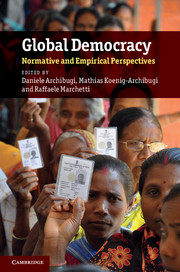Book contents
- Frontmatter
- Contents
- Figures
- Tables
- Notes on contributors
- Acknowledgements
- 1 Introduction
- 2 Models of global democracy
- 3 Citizens or stakeholders?
- 4 Is democratic legitimacy possible for international institutions?
- 5 Cosmopolitan democracy
- 6 Regional versus global democracy
- 7 Towards the metamorphosis of the United Nations
- 8 Flexible government for a globalized world
- 9 Global democracy and domestic analogies
- 10 Global democracy for a partially joined-up world
- 11 Civil society and global democracy
- 12 Global capitalism and global democracy
- 13 From peace between democracies to global democracy
- 14 The promise and perils of global democracy
- Index
- References
7 - Towards the metamorphosis of the United Nations
A proposal for establishing global democracy
Published online by Cambridge University Press: 05 June 2012
- Frontmatter
- Contents
- Figures
- Tables
- Notes on contributors
- Acknowledgements
- 1 Introduction
- 2 Models of global democracy
- 3 Citizens or stakeholders?
- 4 Is democratic legitimacy possible for international institutions?
- 5 Cosmopolitan democracy
- 6 Regional versus global democracy
- 7 Towards the metamorphosis of the United Nations
- 8 Flexible government for a globalized world
- 9 Global democracy and domestic analogies
- 10 Global democracy for a partially joined-up world
- 11 Civil society and global democracy
- 12 Global capitalism and global democracy
- 13 From peace between democracies to global democracy
- 14 The promise and perils of global democracy
- Index
- References
Summary
Introduction
On 14 July 2010 Inga-Britt Ahlenius, the outgoing United Nations (UN) Under-Secretary-General for Internal Oversight Services, issued a scathing end-of-assignment report in which she stated that the UN was ‘in a process of decline and reduced relevance’. Ahlenius (2010) was even more damning when she concluded that the UN seems ‘to be seen less and less as a relevant partner in the resolution of world problems . . . [T]his is as sad as it is serious’ (3). The continuing relevance of the UN is a lament that is often heard within the corridors of the organization. Yet the institution remains a forum of last resort when a particular global crisis threatens to overwhelm the international system. This chapter will assess whether the UN remains a viable institutional model for addressing the challenges of the twenty-first century. In particular, the chapter will assess the fallacy of UN reform and suggest that radical transformation is what is required given the never-ending nature of current models of institutional revival. The chapter will assess the recent debates on deepening global democracy and propose a radical transformation of the UN into a World Federation of Nations (WFN). It will assess the practical steps that would be necessary to initiate a radical overhaul of the international system in a manner that could lay the foundation for global democracy.
Global challenges to the UN system
Criticisms of the organization rarely come from within its ranks because the staff for the most part are constrained from openly articulating their views. It is therefore almost impossible to determine whether the views held by Ahlenius are widespread within the organization, or whether they should be regarded as the isolated views of a disgruntled former staff member.
- Type
- Chapter
- Information
- Global DemocracyNormative and Empirical Perspectives, pp. 132 - 149Publisher: Cambridge University PressPrint publication year: 2011
References
- 1
- Cited by

